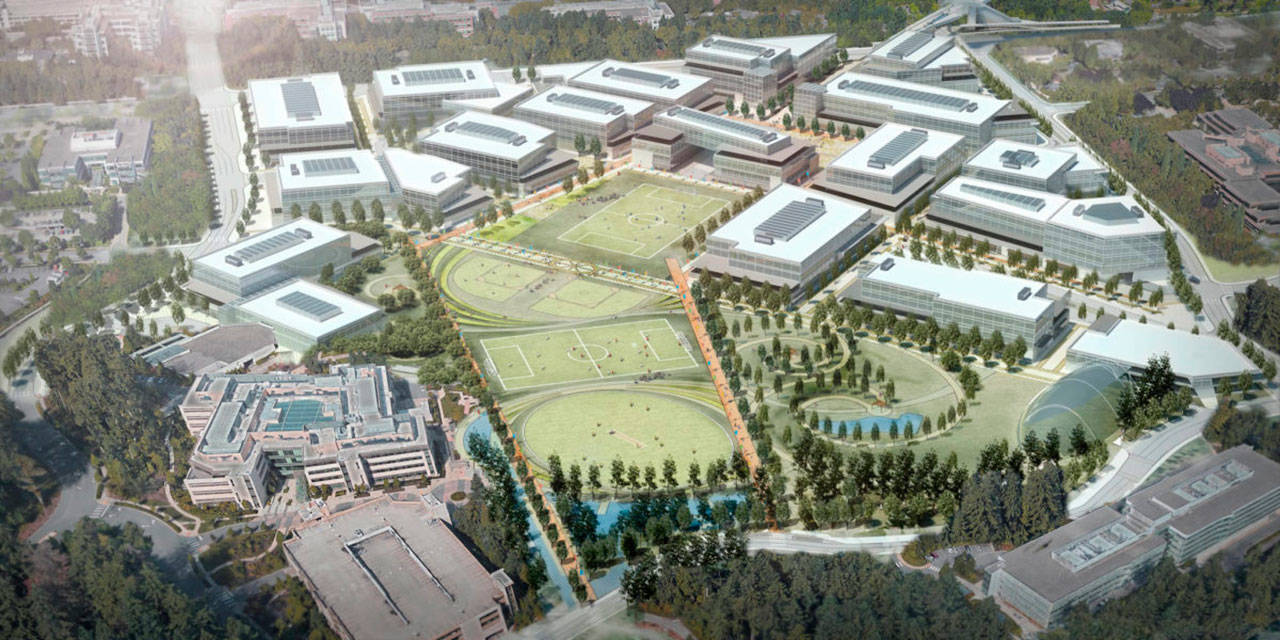Microsoft announced Tuesday that it will begin construction on a massive overhaul and expansion of its facilities in Redmond.
Microsoft, which settled in the city in 1986, will be replacing portions of its campus and create 18 new buildings.
This will include a total of 6.7 million square feet of renovated work space – of which 2.5 million will be new – $150 million in transportation infrastructure improvements, new sports fields, public spaces and green space.
Once it is finished, the Redmond campus will have 131 buildings that will house 47,000 employees and room to expand and accommodate 8,000 more.
“It’s an investment that’s good for our employees, good for the Puget Sound community, and makes good sense for our shareholders,” Microsoft President Brad Smith said on the company blog with the headline, “Investing to grow right here at home.”
Smith added: “We are not only creating a world-class work environment to help retain and attract the best and brightest global talent, but also building a campus that our neighbors can enjoy, and that we can build in a fiscally smart way with low environmental impact.”
The project will break ground in the fall of 2018 and take between five and seven years and is slated to come online around the time Redmond receives its Light Link rail stations in 2023 and 2024.
A 50-foot-wide pedestrian bridge will link the campus to the light rail stations, which is a scaled-up version of the 15-foot bridge originally funded by Sound Transit.
Redmond Mayor John Marchione praised the expansion and the company’s decision to continue expanding in the city.
“The re-imagining of the Microsoft campus highlights their global leadership in technology and strengthens both Redmond’s and the region’s reputation as a hub for ingenuity,” he said.
Microsoft only notified the city of its plans the night before, but Marchione said the company is still operating under a 20-year development and mitigation agreement that was approved by the city in 2005.
No construction permits have yet been submitted by Microsoft.
“We prize our relationship with the City of Redmond and will work closely with officials on the approval for campus and building architectural designs, engineering, building permit review and land use code compliance. As a Zero Waste Certified campus we will continue to focus further on waste-reduction initiatives,” Smith said.
The announcement has also received praise from county officials.
King County Executive Dow Constantine released a statement on Microsoft’s decision as well.
“Microsoft’s bold investment in 2.5 million square feet of new office space demonstrates the company’s clear understanding that this is the best place in the nation to grow,” he said in the statement. “For more than 30 years, Microsoft has fueled a regional economy built on knowledge, innovation, and creativity. With this major new investment in its Redmond campus, Microsoft strengthens its partnership with King County, it’s commitment to Central Puget Sound, and our future as a leading global technology center.”
The renovations include modernizing office spaces.
When it was built, identical offices and natural light were incorporated into the design but the buildings also have low ceilings and many hallways, a press release from Microsoft said.
The rebuilt campus will focus on a more communal space for employees.
It will feature a two-acre plaza with space for up to 12,000 people to gather and various sports fields, including a cricket pitch.
“As Microsoft continues to create the tools and services that are shaping the future of work, we can’t think of a better time to modernize our campus into a model of ingenuity and innovation,” Smith added.
OneRedmond CEO Bart Phillips offered some insight into Microsoft’s expansion.
“Microsoft’s decision to reinvent its campus for its future growth reconfirms Redmond’s and the region’s attractiveness and support for innovation and talent. This is a huge boost for Redmond and the Seattle region,” he said. OneRedmond, a public-private partnership, serves to promote development in the city.
The land which the campus is located on was originally one of Puget Sound’s largest chicken farms and a ranch owned by Italian immigrants, according to the Redmond Historical Society.
Joe Townsend, president of the Redmond Historical Society, wishes Microsoft well on its project and said the company can be depended on to design and erect buildings that will complement the city.
He said that Microsoft and the historical society have close ties. Townsend’s organization is part of a team developing interpreted signage for wetlands that Microsoft is preserving on its campus along Northeast 40th Street. Also, last year, Microsoft funded the printing of the Historic Downtown Redmond Walking Guide.
Reporter editor Andy Nystrom contributed to this story.


